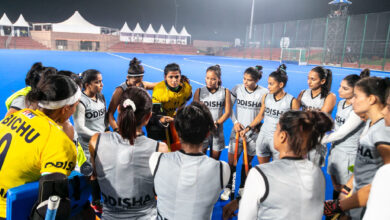Soldier, who lost leg in landmine accident at Uri, is India’s blade-jumper at para Asian Games | Sport-others News

BACK IN 2013, Someswara Rao was struggling with the trauma of losing his left leg from below the knee in a landmine explosion in Uri sector of J&K. The young Army soldier was still undergoing treatment when the thought of ending it all crossed his mind one day. With a blade in hand, he hopped to the bathroom. But a phone call saved his life.
“It’s because my mom called me that day that I am sitting here and talking to you today. When I heard my mom’s voice, I started weeping and then just fell unconscious. For the next 10 days, I was in and out of the ICU,” Rao, 33, told The Indian Express.
Although he promised himself that he would never entertain such thoughts again, the amputation brought back grim memories – until a chance meeting with an Army para triathlete, Lt Colonel Gaurav Dutta, gave him a new purpose in life.
Inspired Lt Colonel Dutta, 54, whom he met at the Artificial Limb Centre in Pune, Rao took to track and field. He started as a blade-runner but later switched to long jump, an event in which he will represent India in the Para Asian Games at Hangzhou later this year.
Lt Colonel Dutta has been instrumental in setting up the Army’s Paralympics Node (APN) in 2017. At the October 22 to 28 Para Asian Games, eight trainees from APN, including Rao, will be part of the Indian squad.
Along with Rao, Solai Raj and Unni Renu will be the jumpers, while Jasbir Singh and Ajay Kumar will participate in the 400 metres event. The shot put event will see Hokato Sema, Soman Rana and Virender in action.
Madras Regiment para long jumpers Someswar Rao (grey kit) and Solai Raj (red) during the final Asiad trials at JLN in New Delhi on Tuesday. (Express photo Abhinav Saha)
The trials were held at Jawaharlal Nehru Stadium in New Delhi on Tuesday.
When Rao joined the 11 Madras Regiment of the Indian Army in 2011, he looked forward to his posting in the Uri sector. He was drafted into the Ghatak Platoon, a reputed unit made up of the country’s finest soldiers.
Recalling the day when his life changed, Rao said, “A landmine had gone off in a trench in Uri the previous night. We went there to inspect and since it was pitch dark we had light flares…. That night nothing happened. But the next morning, while we were going back to the trench, I stepped on a landmine.”
“That’s a path we had taken so many times but that day it wasn’t the same,” said Rao, who has also won multiple international Grand Prix medals in sprints.
The story of 12 Dogra Regiment soldier Ajay Kumar, 33, is similar. Also from Ghatak Platoon, Ajay, too, lost his limb in a landmine explosion during surveillance in Uri sector. After the 2017 incident, he was given an adminrative posting, something he never enjoyed.
“I felt out of place. I just called up Dutta sahab and said I can’t do this, please let me join sports. Sports has given us a second innings in life. If it weren’t for sports, I don’t think we would be this happy,” Ajay said.
Army para athletes and coaches at their Delhi Cantt Centre. (Express photo)
Although Lt Colonel Dutta’s intervention has changed lives of several youngsters, he remains unsatisfied – there’s much more to be done in para sports in India.
“I understand what these men go through. Just a day back you were a warrior and then the very next day you think you aren’t even fit enough to work in the fields. I mentor them and tell them about sports and how big it is to even compete in events,” said Lt Colonel Dutta, who survived landmine injuries in 2001.
Shot putter Hokato Sema said he also owes his entry to sports to “Dutta Sahab”.
The 9 Assam Regiment soldier was just a teenager when he opted to take part in an operation at the LoC in 2002. “When I raised my hand my officer asked me ‘Why do you want to go? You’re so young?’ A close friend from Nagaland also told me it was too risky. We both wanted to eventually join the special forces (para commandos),” said the 39-year-old Hokato, who like others made the Asiad cut on the basis of rankings and trials.
Hokato told his friend that after the J&K mission, they both would volunteer for the special forces. “We were exchanging fire with infiltrators. And while running on the snow I stepped on a landmine. My dreams of being a para commando were shattered,” said Hokato.
“My friend is a commando today,” he said, after a long pause.
For the next 14 years, Hokato served the Army in admin-related work and never gave sports a thought. In 2016, the Nagaland resident applied for voluntary retirement and was on his way home. “Then Dutta Sahab called me and said I should do sports. I didn’t even know that para-sports was a thing back then,” said the 2017 China Grand Prix bronze medall.




